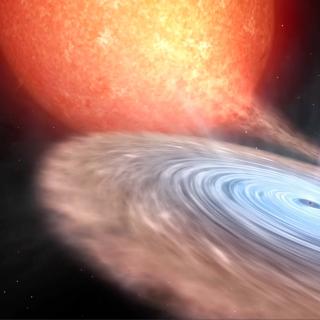Bibcode
Casares, J.; Muñoz-Darias, T.; Mata Sánchez, D.; Fender, R. P.; Armas Padilla, M.; Mooley, K.; Hardy, L.; Charles, P. A.; Ponti, G.; Motta, S. E.; Dhillon, V. S.; Gandhi, P.; Jiménez-Ibarra, F.; Butterley, T.; Carey, S.; Grainge, K. J. B.; Hickish, J.; Littlefair, S. P.; Perrott, Y. C.; Razavi-Ghods, N.; Rumsey, C.; Scaife, A. M. M.; Scott, P. F.; Titterington, D. J.; Wilson, R. W.
Referencia bibliográfica
Monthly Notices of the Royal Astronomical Society: Letters, Volume 465, Issue 1, p.L124-L128
Fecha de publicación:
2
2017
Número de citas
40
Número de citas referidas
39
Descripción
After more than 26 years in quiescence, the black hole transient V404
Cyg went into a luminous outburst in 2015 June, and additional activity
was detected in late December of the same year. Here, we present an
optical spectroscopic follow-up of the December mini-outburst, together
with X-ray, optical and radio monitoring that spanned more than a month.
Strong flares with gradually increasing intensity are detected in the
three spectral ranges during the ∼10 d following the Swift trigger.
Our optical spectra reveal the presence of a fast outflowing wind, as
implied by the detection of a P-Cyg profile (He I-5876 Å) with a
terminal velocity of ∼2500 km s-1 . Nebular-like spectra
- with an Hα equivalent width of ∼500 Å - are also
observed. All these features are similar to those seen during the main
2015 June outburst. Thus, the fast optical wind simultaneous with the
radio jet is most likely present in every V404 Cyg outburst. Finally, we
report on the detection of a strong radio flare in late 2016 January,
when X-ray and optical monitoring had stopped due to Sun constraints.
Proyectos relacionados

Agujeros negros, estrellas de neutrones, enanas blancas y su entorno local
Los agujeros negros y estrellas de neutrones en binarias de rayos-X son laboratorios únicos para explorar la física de estos objetos compactos. No solo permiten confirmar la existencia de agujeros negros de origen estelar a través de mediciones dinámicas de sus masas, sino que también permiten investigar el comportamiento de la materia y la
Montserrat
Armas Padilla